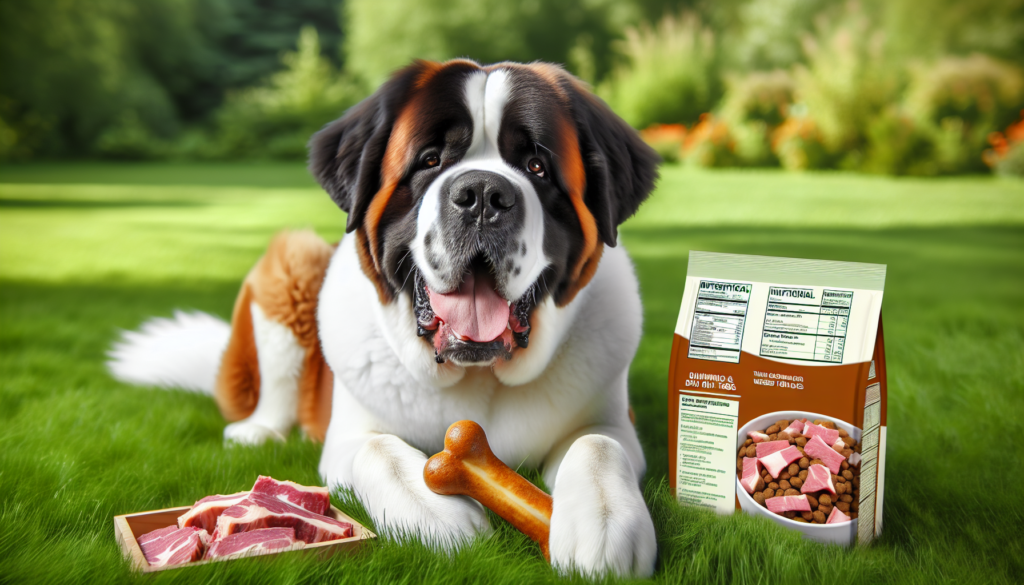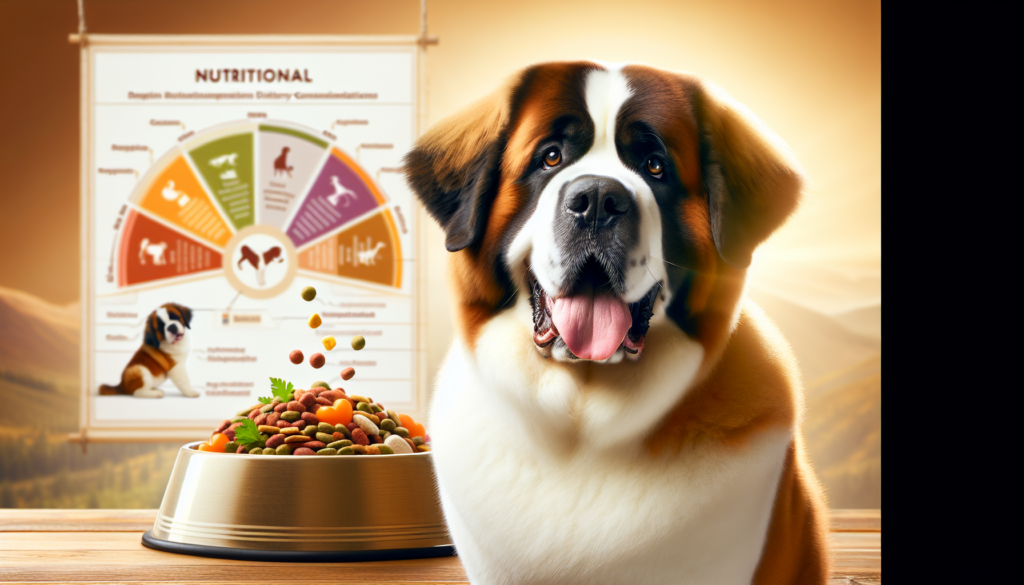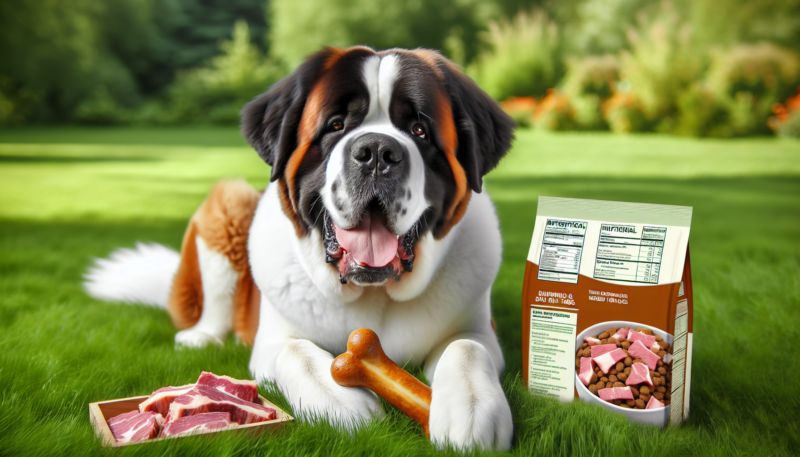If you’re a proud owner of a majestic Saint Bernard, then you know just how important it is to provide them with the best nutrition possible. With their size and unique dietary needs, finding the right dog food can be a daunting task. But fear not, because this article is here to help you navigate through the sea of options and choose the ultimate dog food for your beloved Saint Bernard. So, grab a cup of tea, sit back, and let’s embark on a journey to discover the best dog food that will keep your furry friend happy, healthy, and tail-waggingly satisfied.

Understanding the Nutritional Needs of Saint Bernards
Saint Bernards are large and majestic dogs that require specific nutritional considerations to support their size and weight. Understanding their nutritional needs is crucial for their overall health and well-being. In this article, we will explore the size and weight considerations, activity levels, and growth and development stages of Saint Bernards to help you choose the best dog food for your furry friend.
Size and Weight Considerations
One of the first things to consider when it comes to the nutritional needs of Saint Bernards is their size and weight. These gentle giants can reach an impressive weight of over 150 pounds and stand at a height of up to 30 inches at the shoulder. Due to their large size, Saint Bernards have a slower metabolism compared to smaller dogs. This means that they require a diet that is specifically formulated to meet their unique needs and provide them with the right amount of energy to support their size.
Activity Levels
While Saint Bernards may have a calm and gentle demeanor, they still require regular exercise to keep them healthy and prevent obesity. Despite their immense size, Saint Bernards are not overly active dogs. However, they still benefit from daily walks and moderate exercise to maintain their muscle tone and overall fitness. It is important to consider their relatively low activity levels when determining the appropriate calorie intake and nutrient balance for your Saint Bernard.
Growth and Development Stages
Saint Bernards go through various growth and development stages, just like any other dog breed. However, due to their large size, they have specific nutritional requirements during these stages. It is crucial to provide them with a high-quality diet that supports their rapid growth and development while ensuring proper bone and joint health. During the puppy stage, a diet rich in protein, vitamins, and minerals is essential for their overall growth. As they transition into adulthood, maintaining their nutrient balance becomes equally important.
Essential Nutrients for Saint Bernards
To keep your Saint Bernard healthy and thriving, it is essential to provide them with a balanced diet that includes all the necessary nutrients. Here are the essential nutrients that should be present in their diet:
Protein
Protein is a crucial component of a Saint Bernard’s diet as it supports muscle growth, repair, and maintenance. High-quality sources of protein, such as lean meats, fish, and eggs, should be included in their diet to ensure they receive the necessary amino acids for optimal health.
Fat
Fat is an important source of energy for Saint Bernards and helps maintain healthy skin and coat. Including healthy fats, such as omega-3 fatty acids from fish oil, can promote a lustrous coat and support joint health.
Carbohydrates
Carbohydrates provide a readily available source of energy for Saint Bernards. Including carbohydrate sources like whole grains and vegetables in their diet can provide them with sustained energy throughout the day.
Vitamins
Vitamins play a vital role in various bodily functions and should be present in a Saint Bernard’s diet. Vitamin A promotes healthy vision, vitamin D supports bone health, and vitamin E acts as an antioxidant. These vitamins can be found in fruits, vegetables, and fortified dog foods.
Minerals
Minerals, such as calcium and phosphorus, are crucial for bone and teeth health in Saint Bernards. Additionally, minerals like zinc and iron help maintain a strong immune system. Including mineral-rich foods like dairy products and lean meats can help ensure they receive these essential minerals.
Types of Dog Food for Saint Bernards
When it comes to choosing the right dog food for your Saint Bernard, there are several options to consider. Each type of dog food has its own benefits and drawbacks, so it’s important to select the one that best suits your dog’s specific needs.
Dry Dog Food
Dry dog food, also known as kibble, is a popular option for many Saint Bernard owners. It is convenient, easy to store, and has a long shelf life. Dry dog food also helps promote dental health by reducing plaque and tartar buildup. Look for high-quality dry dog food that contains a good balance of protein, fat, and carbohydrates.
Wet Dog Food
Wet dog food, often packaged in cans or pouches, contains a higher moisture content compared to dry dog food. This can be beneficial for Saint Bernards that may need additional hydration. Wet dog food is also generally more palatable for picky eaters. However, it tends to be more expensive and has a shorter shelf life once opened.
Raw Food Diet
Some Saint Bernard owners opt for a raw food diet, which consists of feeding their dogs uncooked meat, bones, fruits, and vegetables. Proponents of this diet believe that it closely resembles what dogs would eat in the wild and can provide numerous health benefits. However, it is important to consult with a veterinarian before transitioning to a raw food diet, as it can be difficult to achieve the right balance of nutrients.
Homemade Dog Food
Homemade dog food is prepared from scratch using fresh ingredients. It allows you to have complete control over the ingredients included in your dog’s diet. However, it is crucial to ensure you are providing a balanced diet that meets all of your Saint Bernard’s nutritional needs, which can be challenging. Consulting with a veterinary nutritionist is recommended if you choose to prepare homemade dog food.

Choosing High-Quality Dog Food
Selecting high-quality dog food is essential for the health and well-being of your Saint Bernard. Here are some important factors to consider when choosing the best dog food for your furry friend.
Identifying the First Ingredient
When looking at the ingredient list of a dog food, the first ingredient should ideally be a high-quality source of protein. Look for specific meat sources like chicken, beef, or fish, rather than generic terms like “meat” or “animal by-products.” High-quality protein is crucial for Saint Bernards’ muscle development and overall health.
Checking for Adequate Protein Content
Protein should make up a significant portion of your Saint Bernard’s diet. Ensure that the dog food contains a minimum protein content of around 25-30%, depending on your dog’s age and activity level. This will help support their growth and maintain their lean muscle mass.
Avoiding Fillers and Artificial Ingredients
Avoid dog foods that contain excessive fillers, such as corn or wheat, as they provide minimal nutritional value. These fillers can lead to weight gain and digestive issues. Additionally, steer clear of dog foods that contain artificial preservatives, colors, and flavors, as these may have negative health effects in the long run.
Considering Special Dietary Needs
If your Saint Bernard has any specific dietary needs, such as allergies or sensitivities, it is crucial to choose a dog food that addresses those needs. Look for specialized formulas that are grain-free, hypoallergenic, or specifically formulated for dogs with sensitive stomachs. Consulting with your veterinarian can help guide you towards the best options for your dog’s specific needs.
Special Considerations for Saint Bernards
Although Saint Bernards are generally healthy dogs, there are a few special considerations to keep in mind when it comes to their diet and overall well-being.
Joint and Bone Health
Due to their large size, Saint Bernards are prone to joint and bone issues, such as hip dysplasia and arthritis. Selecting a dog food that contains added joint-supporting supplements, such as glucosamine and chondroitin, can help maintain their joint health and mobility.
Weight Management
Saint Bernards have a tendency to gain weight easily, which can put additional stress on their joints and lead to health problems. Opt for a dog food that is specifically formulated for large-breed dogs and monitor their calorie intake to prevent obesity. Additionally, regular exercise is key to maintaining a healthy weight for your Saint Bernard.
Allergies or Food Sensitivities
Some Saint Bernards may have allergies or food sensitivities, which can lead to skin issues, digestive problems, or other health concerns. If you notice signs of allergies, such as itching, excessive licking, or gastrointestinal upset, it is important to identify and eliminate the trigger food from their diet. Consulting with a veterinarian can help pinpoint the specific allergen and recommend appropriate dietary changes.
Digestive Health
Saint Bernards can be prone to digestive issues, such as bloat or sensitive stomachs. Feeding them smaller, frequent meals throughout the day can help prevent bloating. Additionally, choosing a dog food that contains easily digestible ingredients, like whole grains or limited ingredient formulas, can help support their digestive health.
Consulting with Your Veterinarian
It is important to remember that every dog is unique, and their nutritional needs may vary. Consulting with your veterinarian is crucial to ensure that you are providing the best possible diet for your Saint Bernard. Here are some reasons why veterinary advice is essential:
Importance of Veterinary Advice
Veterinarians have expert knowledge on nutrition and can provide personalized recommendations based on your Saint Bernard’s specific needs. They can help you navigate through the numerous options available and ensure your dog’s diet supports their overall health.
Discussing Breed-Specific Needs
Your veterinarian can help you understand the breed-specific nutritional needs of Saint Bernards. They can provide guidance on the protein, fat, and carbohydrate requirements for optimal growth, bone development, and overall health.
Addressing Medical Conditions or Allergies
If your Saint Bernard has any underlying medical conditions or allergies, your veterinarian can help identify and address them. They can recommend specific dog foods or dietary modifications to alleviate symptoms and support your dog’s well-being.
Determining the Right Portion Size
Determining the appropriate portion size for your Saint Bernard can be challenging. Your veterinarian can assess your dog’s body condition and activity level to calculate the right amount of food they need. They can also guide you in adjusting the portion size as your dog’s needs change over time.
Transitioning to a New Dog Food
When switching your Saint Bernard to a new dog food, it is important to do so gradually to prevent digestive upset. Here are some steps to follow when transitioning to a new dog food:
Gradual Introduction
Start by mixing a small amount of the new dog food with your Saint Bernard’s current food. Gradually increase the proportion of the new food while decreasing the old food over a period of 7-10 days. This gradual transition allows their digestive system to adjust to the new diet.
Monitoring for Any Adverse Reactions
During the transition period, closely monitor your Saint Bernard for any adverse reactions, such as diarrhea, vomiting, or changes in appetite. If you notice any concerning symptoms, consult with your veterinarian.
Adjusting the Amounts as Needed
After the transition period, monitor your Saint Bernard’s weight and overall condition. Make adjustments to the portion size as needed to ensure they maintain a healthy weight and optimal body condition. If you have any concerns or questions, consult with your veterinarian.
Top Recommended Dog Food Brands for Saint Bernards
Choosing the best dog food for your Saint Bernard can be overwhelming, given the wide array of options available. Here are some top dog food brands that have proven to be popular and reliable choices among Saint Bernard owners:
Brand 1
Brand 1 is known for its high-quality ingredients and focus on breed-specific nutrition. Their formulas are specifically designed for large-breed dogs like Saint Bernards, carefully balancing protein, fat, and carbohydrates to support their growth and overall health.
Brand 2
Brand 2 offers a range of dog food options that are grain-free and made from high-quality ingredients. Their formulas are rich in protein and contain beneficial supplements, such as glucosamine and chondroitin, to support joint health in Saint Bernards.
Brand 3
Brand 3 has gained popularity among Saint Bernard owners for their hypoallergenic formulas. These formulas are ideal for dogs with food sensitivities or allergies, providing a limited ingredient diet that is gentle on their digestive systems.
Brand 4
Brand 4 specializes in raw dog food diets and offers a variety of options that mimic a dog’s natural diet. These formulas contain high-quality, human-grade ingredients, providing the essential nutrients that Saint Bernards need for optimal health.
Brand 5
Brand 5 is renowned for its wide selection of large-breed dog food formulas. They incorporate high-quality protein sources, wholesome grains, and essential supplements to support the unique needs of Saint Bernards.
Feeding Guide for Saint Bernards
Feeding your Saint Bernard the appropriate amount of food is essential to maintain their overall health and prevent weight-related issues. Here are some general guidelines to consider:
Feeding Frequency
Saint Bernards generally do well with two meals a day, although some owners prefer to feed them one large meal. Dividing their daily food intake into two meals helps prevent bloating and aids in digestion. However, it’s important to consult with your veterinarian to determine the best feeding frequency for your dog, considering their age, activity level, and specific needs.
Portion Sizes
The exact portion sizes for your Saint Bernard will depend on various factors, including their age, weight, and activity level. As a general guideline, adult Saint Bernards typically require around 3-5 cups of high-quality dry dog food per day, divided into two meals. However, it’s crucial to consult with your veterinarian for a more accurate recommendation tailored to your dog’s specific needs.
Water Availability
Always ensure that fresh and clean water is readily available for your Saint Bernard. Due to their large size, Saint Bernards have higher water requirements compared to smaller breeds. Make sure to refill their water bowl regularly throughout the day to keep them hydrated.
Conclusion
Understanding the nutritional needs of Saint Bernards is key to providing them with a healthy and balanced diet. Consider their size, activity levels, and growth stages to choose the best dog food for your furry friend. Focus on high-quality ingredients, balanced nutrient profiles, and potentially specialized formulas to address any specific needs your Saint Bernard may have. Remember to consult with your veterinarian for personalized recommendations and feeding guidelines. With the right nutrition, your Saint Bernard will thrive and live a long, happy life.
